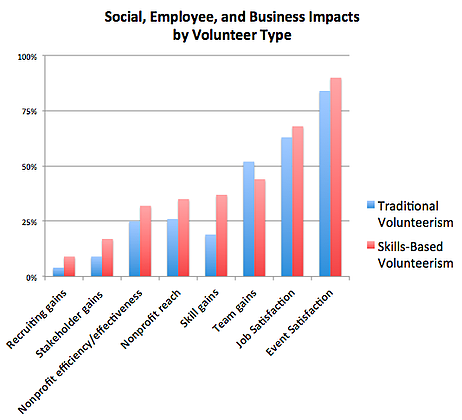So, what are the actual, bottom-line benefits of skills-based volunteerism?
Since 2010, True Impact has collected volunteerism impact data from thousands of employees across dozens of companies and organizations. And while fewer than 15% of volunteers engaged in activities designed to leverage professional skills (as compared to traditional, hands-on volunteerism), we found that these volunteers generated significantly more value across nearly all social, employee, and business categories.

Social Value
Volunteerism provides nonprofits with free services that they might otherwise have had to pay for. From this perspective, sorting food bank donations provides a service equivalent to $11.28 per hour (US Bureau of Labor Statistics mean wage database), while pro bono management consultants provide a service equivalent to $43.38 per hour.
But beyond that, our data show that skills-based volunteers were significantly more likely than traditional, hands-on volunteers to increase the organizational capacity of the nonprofits they were serving, by 35% (increasing nonprofit reach) and 28% (increasing nonprofit efficiency and effectiveness).
Professional Development
Pro bono and skills-based volunteer projects help build new, job-related skills and experiences—by offering greater management responsibility, increasing client or stakeholder interactions, or exposing volunteers to new subject matter, for example—at 95% the rate of traditional volunteer projects.
Sales, Recruitment, and Stakeholder Relations
Community involvement influences employee recruitment by increasing the visibility of a company’s social mission and generating relationships with new talent. Skills-based volunteers were 125% more likely to report recruitment gains than traditional volunteers.
Skills-based volunteers were also significantly more likely to create and strengthen relationships with regulators, legislators, advocacy groups, or other stakeholders (+89%), and similarly build or strengthen sales-related relationships (+40%). These magnified business benefits, which at their core are about relationship development, may be due to the longer-term nature of skills-based programs' activities: skills-based volunteers served an average of 25 hours, compared to traditional volunteers’ 12 hours.
These findings provide a strong argument in favor of greater skills-based volunteerism in order to increase social and business impacts. If you’d like to learn more about measuring the impact of your volunteering, sign up for a consultation with our team.


